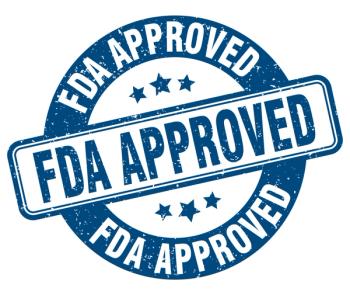
FDA Approves Donanemab (Kisunla) For Early Symptomatic Alzheimer Disease
Donanemab-azbt was approved under the FDA's Fast Track Review, Priority Review, and Breakthrough Therapy designations.
The FDA today approved donanemab-azbt (Kisunla), the first and only amyloid plaque-targeting therapy for early symptomatic Alzheimer disease. Donanemab-azbt “uses a limited-duration treatment regimen based on amyloid plaque removal,” according to a news release from manufacturer Eli Lilly. The drug was granted Fast Track Review, Priority Review, and Breakthrough Therapy designations.1,2
The therapy is indicated for use in adults with early symptomatic Alzheimer disease, which includes individuals with mild cognitive impairment and individuals with the mild dementia stage of
“Kisunla demonstrated very meaningful results for people with early symptomatic Alzheimer disease, who urgently need effective treatment options,” said Anne White, executive vice president and president of Lilly Neuroscience.1 “We know these medicines have the greatest potential benefit when people are treated earlier in their disease, and we are working hard in partnership with others to improve detection and diagnosis.”
READ MORE:
FDA approval was based on data from the multicenter, randomized, double-blind, placebo-controlled, 18-month phase 3 TRAILBLAZER-ALZ 2 (
Within the study cohort (mean age, 73.0 years; 57.4% women; 91% White), 68.1% presented with low to medium tau pathology and 31.8% presented with high tau pathology. At 76 weeks, the least-squares mean change in iARDS score in the low to medium tau pathology group was -6.02 (95% CI, -7.01 to -5.03) in the donanemab group and -9.27 (95% CI, -10.23 to -8.31) in the placebo group, with a between-group difference of 3.25 (95% CI, 1.88-4.62). In the overall combined population—which also included those with high tau pathology—iARDS improvement was -10.2 (95% CI, -11.22 to -9.16) and -13.1 (95% CI, -14.10 to -12.13) in the treatment and placebo groups, respectively, with a between-group difference of 2.92 (95% CI, 1.51-4.33).
Results in both groups were considered statistically significant, and individuals in the donanemab group “had up to a 39% lower risk of progressing to the next clinical stage of disease” than those receiving the placebo.
Compared to the start of the study, treatment reduced amyloid plaques by an average of 61% at 6 months, by 80% at 12 months, and by 84% at 18 months.
“The trial data demonstrated, convincingly, that Kisunla reduces the rate of cognitive and functional decline in patients in the mild cognitive impairment and mild dementia stages of Alzheimer disease,” said Teresa Buracchio, director of the Office of Neuroscience in the FDA’s Center for Drug Evaluation and Research. “Today’s approval is evidence of the FDA’s commitment to helping more safe and effective drugs to treat Alzheimer disease become available.”
“This
Data from the TRAILBLAZER-ALZ 2 trial also indicated that once amyloid plaques were removed, patients could stop therapy, leading to lower treatment costs and fewer infusions. Study participants who were confirmed to have reached minimal levels of amyloid plaque, consistent with a visually negative scan using amyloid positron emission tomography (PET) were able to complete treatment and switch to the placebo group for the remainder of the study. In the overall population, 17%, 47%, and 69% of patients completed treatment at 6, 12, and 18 months, respectively.
As with many blockbuster approvals, cost is a concern. Because of the variability in treatment length, total treatment cost—and out-of-pocket costs for patients—will vary. Coverage and reimbursement are available for eligible patients under Medicare; as of October 2023, eligible Medicare patients also have broad coverage and reimbursement for amyloid PET scans.
“As a physician, I am encouraged by the potential to stop treatment, which could reduce out-of-pocket costs and infusion burden for eligible patients,” Fillit added.
Treatment with donanemab may cause amyloid-related imaging abnormalities (ARIA), which can be detected via MRI. ARIA may present as temporary swelling in areas of the brain, which typically resolves with time, or as small spots of bleeding in or on the surface of the brain. ARIA can be serious and life-threatening events may occur. Individuals with ApoE ε4 homozygotes are at higher risk for ARIA; and testing should be performed before treatment initiation.
In addition to ARIA, the most common adverse effect was headache. There is also a risk for infusion-related reactions, including nausea, vomiting, anaphylaxis, and angioedema. These reactions typically occur during infusion or within 30 minutes post-infusion.
Studies of donanemab are ongoing: TRAILBLAZER-ALZ 3 is focused on preventing symptomatic Alzheimer disease in patients with preclinical disease, TRAILBLAZER-ALZ 5 is a registration trial for early symptomatic Alzheimer disease, enrolling patients in China and Korea, and TRAILBLAZER-ALZ 6 is focused on expanding the understanding of ARIA “through novel MRI sequences, blood-based biomarkers, and different dosing regimens of donanemab.”
It is estimated that nearly 7 million Americans are living with Alzheimer disease; this number is projected to increase to nearly 13 million Americans by 2050. In 2021, Alzheimer disease was the fifth-leading cause of death among adults aged 65 years and older.4
READ MORE:
References
Lilly’s Kisunla (donanemab-azbt) approved by the FDA for the treatment of early symptomatic Alzheimer’s disease. News release. Eli Lilly. July 2, 2024. Accessed July 2, 2024.
https://investor.lilly.com/news-releases/news-release-details/lillys-kisunlatm-donanemab-azbt-approved-fda-treatment-early FDA approves treatment for adults with Alzheimer’s disease. FDA. July 2, 2024. Accessed July 2, 2024.
https://www.fda.gov/drugs/news-events-human-drugs/fda-approves-treatment-adults-alzheimers-disease Sims JR, Zimmer JA, Evans CD, et al; the TRAILBLAZER-ALZ 2 Investigators. Donanemab in early symptomatic Alzheimer disease: The TRAILBLAZER-ALZ 2 randomized clinical trial. JAMA. 2023;330(6):512-527. doi:10.1001/jama.2023.13239
Alzheimer’s disease facts and figures. Alzheimer’s Association. Accessed July 2, 2024.
https://www.alz.org/alzheimers-dementia/facts-figures
Newsletter
Pharmacy practice is always changing. Stay ahead of the curve with the Drug Topics newsletter and get the latest drug information, industry trends, and patient care tips.























